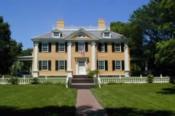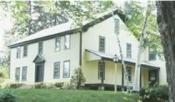A couple of months back, I was asked to participate in a panel discussion about Literary Landmarks* that comprised the better part of a weekly radio show, Radio Boston, which airs on Fridays on WBUR-Boston (90.9 FM). I was pleased to accept the invitation because I have been involved with an emerging literary land-marking project for several years at the Mass Center for the Book and I thought this would be a great way to get the word out about the project.
 The host of Radio Boston, David Boeri, was inspired to do the show after hearing about the financial difficulties at "The Mount," Edith Wharton’s estate in Lenox, and a good deal of the discussion focused on that particular house, though we were able to spend some time talking about Longfellow’s house in Cambridge and Herman Melvilles in Pittsfield as well as a handful
The host of Radio Boston, David Boeri, was inspired to do the show after hearing about the financial difficulties at "The Mount," Edith Wharton’s estate in Lenox, and a good deal of the discussion focused on that particular house, though we were able to spend some time talking about Longfellow’s house in Cambridge and Herman Melvilles in Pittsfield as well as a handful of other memorial rather than museum sites.
of other memorial rather than museum sites.
It was a good discussion, but I came away from the show with a nagging feeling that there was an underlying question or–maybe better–skepticism about literary landmarks that had been left unaddressed. As Susan Wilson, Matthew Pearl and I spoke about the value of literary land-marking, about the importance of preserving a geographical dimension to reading experience, Boeri came as close as he would to giving voice to what I presume was his doubt. He asked how far we should go, how much we should do to preserve literary landmarks. Susan’s reply was unhesitating and unequivocal: We should do as much as we have to.
Of course, David had three book nerds on the panel–Susan is the author of The Literary Trail of Greater Boston, Matthew’s first two novels, The Dante Club and Poe’s Shadow, are literary-historical fictions, and I, as you know, direct the Massachusetts Center for the Book. All of us felt that Susan was spot on with her remark.
Nevertheless, I could almost feel David thinking, "Come on . . . are these sites really all that important?" It’s possible I was reading into his reactions the response I have come to expect . . . a broad-based assumption that we are talking about the icing rather than the cake, about what’s nice rather than what’s necessary. But I know there is a viable argument to make that literary sites, literary figures, and literary products are as important to the formation of nationhood as is political and/or military history.
We used to know that. Indeed we even legislated the foundational importance of literature in our state constitution. Chapter V, Section II, reads, in part,
Wisdom, and knowledge, as well as virtue, diffused generally among the body of the people, being necessary for the preservation of their rights and liberties . . . it shall be the duty of legislatures and magistrates, in all future periods of this commonwealth, to cherish the interests of literature and the sciences . . . .
from The Massachusetts Constitution: Chapter V, Section II. The Encouragement of Literature, etc.
Our commonwealth, indeed our country, was founded on enlightened principles that recognized the vital importance of activity beyond the quotidian. We seem, however, over the course of time and under the burdens of tight budgets to have devolved into a utilitarianism that may have us worry about diffusing a "knowledge"–the use-value of which can be measured easily– but that leads us to a systemic wariness about activity in service of achieving those other ideals–of wisdom and of virtue–which are, to use the coin of our achievement realm, "less testable."
Literature has become, in our time, an amusing pastime rather than an essential and cohesive force in the project of America. We have elevated our political history to memorial status–but have treated with suspicion a complementary elevation of our literary history. What our generals have done, in other words, speaks of our American identity, but what our writers have said is tangential to it. We would never question the drive to keep Mt. Vernon open to the public, but we are just not all that sure we need to contribute to a similar effort for "The Mount."
status–but have treated with suspicion a complementary elevation of our literary history. What our generals have done, in other words, speaks of our American identity, but what our writers have said is tangential to it. We would never question the drive to keep Mt. Vernon open to the public, but we are just not all that sure we need to contribute to a similar effort for "The Mount."
I’d like to think that we can stop that train of thought and prejudice and move in a direction that brings us back to an understanding of the centrality of the written word in the formation of our national identity and to an appreciation for the works of our great authors as important contributions to the ties that bind us together as a country.
We have a great opportunity to do that in Massachusetts–where we have 16 literary houses open to the public, numerous museums and special libraries devoted to the art and culture of books, and many literary memorial sites easily accessible to the cultural traveler. You can visit many of these heritage sites with the first edition of the Literary Map of Massachusetts as your guide. Created by an editorial board at the Massachusetts Center for the Book and funded with a grant from Mass Humanities, this map is a great beginning, and we are happy to provide you with copies for a modest shipping and handling fee if you contact our office [literarymap@massbook.org].
Many more literary sites can be added to the inventory, and Mass Center for the Book will gladly partner with community organizations to establish new literary landmarks. We have just partnered with Historic Northampton to establish a landmark for Gehenna Press, one of the most important private presses of the 20th century operating in the world. The marker will be part of Historic Northampton’s historical sites project and will have its formal unveiling on November 12th at a ceremony in Florence. You’ll be able to read the literary land-marker at 51 Clark Avenue in Northampton soon thereafter.
What comes of a renewed attention to our literary history is up to all of us. For these landmarks are not ends in themselves but, instead, invitations to further exploration. Perhaps we will choose a book from one of our commonwealth authors for a community-read. We may decide to hold a community festival to celebrate a local writer. We may partner with other communities to create a literary trail between our landmarks. We may explore the artisanal book arts and soon find ourselves in a bookbinding course at the Garage Annex School in Easthampton. No matter what we do, we shall be making an important contribution to the life of our literary history.
* To access the radio show from the WBUR archives, visit www.radioboston.org and search for "Literary Landmarks."

